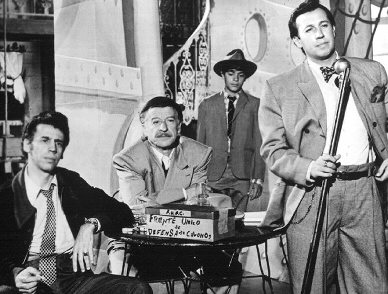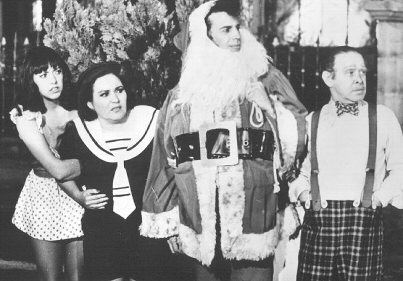Tivoli
(CONACINE/DASA, 1974) Dir: Alberto Isaac; Scr:
Alberto Isaac, Alfonso Arau; Photo: Jorge Stahl Jr.; Music:
Rubén Fuentes, Eduardo Magallanés; Prod Chief: Fidel
Pizarro; Asst Dir: Mario Llorca; Film Ed: Rafael Ceballos;
Art Dir: José Rodríguez Granada; Decor:
Raúl Serrano; Choreog: Xavier Fuentes; Sound: Javier
Mateos; Sound Ed: Sigfrido García; Union: STPC;
Eastmancolor
Cast: Alfonso Arau (Tiliches), Pancho Córdova
(Jesús Quijano "Quijanito"), Lyn May (Eva Candela),
Carmena Salinas (Chapas), Harapos [Mario García]
(Harapos), Héctor Ortega (Lic. Félix Pantoja "El
Cacomixtle"), Dorotea Guerra (Lilí), Ernesto
Gómez Cruz (Engineer Reginaldo T.), Dámaso
Pérez Prado (himself), The Dolly Sisters
(themselves), Don Facundo (himself), Willy (Willy),
Gina Morett (Mimí Manila), Consuelo Quezada and Margarita
Alfaro (dwarfs), Zuzy D' Tornell (Naná), Alfredo Soto
(El Diablo), Germán Funes (homosexual), Francisco
Muller (Bulmaro), José Luis Aguirre "Trotsky" (Wakiki
emcee), Juan José Martínez Casado (Pueyo),
Roberto Corel (Tarragón), Gerardo Zepeda (El
Criaturón), Dai Won Moon (Chi), Xavier Fuentes (stage
director), Mario Zebadua "Colocho" (blind man), Carolina Barret
(Sra. Quijano), Alberto Mariscal (mayor of Mexico City),
Paloma Zozaya (showgirl), Armando Pascual (Lupe), Sara
Guasch (dress shop owner), Manuel Alvarado (orchestra
leader), Federico González (traffic cop), Juan Garza
(bodyguard), Elsa Benn, Chino Ibarra (trumpeter), Cristal,
Paco Sañudo (performer), Regino Herrera (man in waiting
 room), Nathanael León "Frankestein" (Sobera), Alfredo
Gutiérrez (man with Reginaldo), Claudio Isaac (TV
cameraman), León Michel (TV director), Miguel
Ángel Ferriz nieto, Inés Murillo (doña
Ingracia), Ramiro Orci (police agent), Armando Duarte, Miguel
Inclán Jr., Carlos Gómez, Lupita Perullero, Héctor
Kiev, M. Narvaez "Fufurufa," Jesús Duarte, Rubén
Calderón
room), Nathanael León "Frankestein" (Sobera), Alfredo
Gutiérrez (man with Reginaldo), Claudio Isaac (TV
cameraman), León Michel (TV director), Miguel
Ángel Ferriz nieto, Inés Murillo (doña
Ingracia), Ramiro Orci (police agent), Armando Duarte, Miguel
Inclán Jr., Carlos Gómez, Lupita Perullero, Héctor
Kiev, M. Narvaez "Fufurufa," Jesús Duarte, Rubén
Calderón
Notes: Tivoli was one of Alberto Isaac's most
popular movies, a nostalgic evocation of late 1940s and early 1950s Mexico
City, complete with variety theatres, nightclubs, exotic dancers, mambo
music, and wise-cracking comedians. A historical note: there actually
was a Tivoli theatre in Mexico City--inaugurated in 1946 by Manuel
Medel and his then-wife, Rosita Fornés--but the film does not
purport to tell the story of that particular edifice. Instead, Isaac and
Arau create a pastiche of the numerous venues of the era, just as Arau's
character "Tiliches" is a combination of Cantinflas, Resortes, Palillo,
and other comics.
In early 1950s Mexico City, engineer Reginaldo proposes an urban
renewal plan which will wipe out whole blocks of lower-class apartment
buildings and the Tivoli theatre, "where they shamelessly exhibit nude
women and make irreverent jokes" (according to a bogus "protest" flyer
concocted for publicity purposes by the Tivoli's manager, Quijanito).
Quijanito and his star comedian Tiliches spearhead an effort to save their
building, hiring lawyer Pantoja and arranging for a gala benefit
performance featuring Pérez Prado and his orchestra among the acts.
However, all of their efforts fail and the theatre is demolished.
Tivoli contains a number of sub-plots, or perhaps it would
be more accurate to describe them as detours, diversions, or asides. The
film begins with what seems to be a rivalry between exotic dancers
Mimí Manila and Eva Candela--Eva, at the urging of Tiliches, does a
"full Monty," inflaming the crowd. Mimí's big number is a
"schoolgirl striptease" in a stage "bedroom" decorated with huge portraits
of Pedro Infante, Emilio Tuero, etc., but her character subsequently
vanishes from the plot with no explanation. Eva marries Reginaldo and
retires from the stage, but takes advantage of his absence to make a final
appearance during the benefit show, exposing her breasts one last time.
The irritated Tivoli performers take Eva--who defends her husband's
intentions as honorable-- to a brothel
where they find Reginaldo, the crooked Pantoja, and (unseen)
the mayor; Tiliches attacks Pantoja, but is badly beaten by bodyguard El
Criaturón, who also brutally kills a gay member of the Tivoli
cast.

Tiliches himself quits the theatre midway through the movie to take
a job on television. His "act" consists of reading the newspaper and
commenting on the articles (a la Will Rogers), but he's cut off in the
middle of the show when he starts to talk about the upcoming urban renewal
plan and how it will affect the Tivoli performers and their families.
Later, Tiliches gets drunk and makes a pass at the dance partner of Chi,
an Asian performer. Chi not only beats up Tiliches, he uses kung fu to
wreck Tiliches' flashy car!
There are numerous other brief but amusing vignettes, including
Lilí's failed attempt to replace Eva as the featured stripper
(first she worries her bust isn't large enough, then--when she finally
makes her debut--spots her parents in the audience, stops stripping, and
starts to sing the "Canción mixteca!"), Don Facundo's repeated
efforts to develop a hit act (he achieves success with a rat that squeaks
"The Blue Danube" and two roosters who dance the cha-cha-cha, both
"performances" achieved by means of animal cruelty), and Quijanito's
repeatedly-interrupted sexual liaisons with various showgirls.

Tivoli is an extremely "layered" movie, full of interesting
details and allusions. Early in the film, Tiliches refuses to visit the
mayor's office with Quijanito and other members of the cast, saying it
would only prejudice their case, since his act is the one which
has
repeatedly insulted the government, drawing fines and censure on the
Tivoli; this is a clear reference to Jesús Martínez
"Palillo" and other comedians whose "political" humor drew official
attention during this era. In one sequence, Tiliches, Chapas, Harapos and
Lilí are kidnaped and taken to the mayor's Christmas party, where
they are ordered to perform. As Santa Claus, Tiliches pulls various
objects from his sack and makes jokes--mostly political--about them, as
the well-dressed audience sits, stone-faced. His final "gift" is for the
mayor, a copy of "Ali Baba and the Forty Thieves." When the mayor starts
laughing, the rest of the guests follow suit. During the Tivoli's last
performance, one comic sketch depicts a trail of corruption from the cop
on the beat all the way up to "the Man." The performers' last ditch effort
is to rig up a sound truck and drive to the Zócalo, where they try
to attract the attention of the president (but the truck breaks down and
the police force them to push it away).
One aspect of Tivoli which probably contributed to its
popularity yet rather disrupts the film's dramatic flow are the musical
numbers, often included in their entirety, whether or not (and usually
not) they have a specific plot function. These sequences add to the
nostalgic flavor of the movie and while they may seem intrusive if
considered in the context of Hollywood cinema, such interpolations are not
at all unusual in Mexican cinema.
The performances and production values are all satisfactory. Some of
the men's hairstyles aren't quite 1950s, and some of the "period"
performers look a little long in the tooth, but for the most part the
period is pleasantly and authentically evoked. Arau is clearly the star,
with Córdova holding his own; both men are excellent in their
roles. Dorotea Guerra, a Rosalba Brambilia lookalike, Lyn May, and Carmen
Salinas are good but only have a few scenes each where they are allowed to
display their talents. The rest of the cast is well chosen and
satisfactory overall.
Tivoli is a wonderfully entertaining picture, although the
references to Mexican politics and popular culture will be lost on
non-Mexican audiences.
Trivia note: the curtain at the Tivoli theatre is covered with painted
advertisements, including one for the "Quezada" dance school, which may be
a reference to Isaac's friend and fellow cartoonist, Abel Quezada.
Back to the
Alberto Isaac Page.
This review completed 8 May 2001 by David Wilt
(dwilt@umd.edu).
 room), Nathanael León "Frankestein" (Sobera), Alfredo
Gutiérrez (man with Reginaldo), Claudio Isaac (TV
cameraman), León Michel (TV director), Miguel
Ángel Ferriz nieto, Inés Murillo (doña
Ingracia), Ramiro Orci (police agent), Armando Duarte, Miguel
Inclán Jr., Carlos Gómez, Lupita Perullero, Héctor
Kiev, M. Narvaez "Fufurufa," Jesús Duarte, Rubén
Calderón
room), Nathanael León "Frankestein" (Sobera), Alfredo
Gutiérrez (man with Reginaldo), Claudio Isaac (TV
cameraman), León Michel (TV director), Miguel
Ángel Ferriz nieto, Inés Murillo (doña
Ingracia), Ramiro Orci (police agent), Armando Duarte, Miguel
Inclán Jr., Carlos Gómez, Lupita Perullero, Héctor
Kiev, M. Narvaez "Fufurufa," Jesús Duarte, Rubén
Calderón
